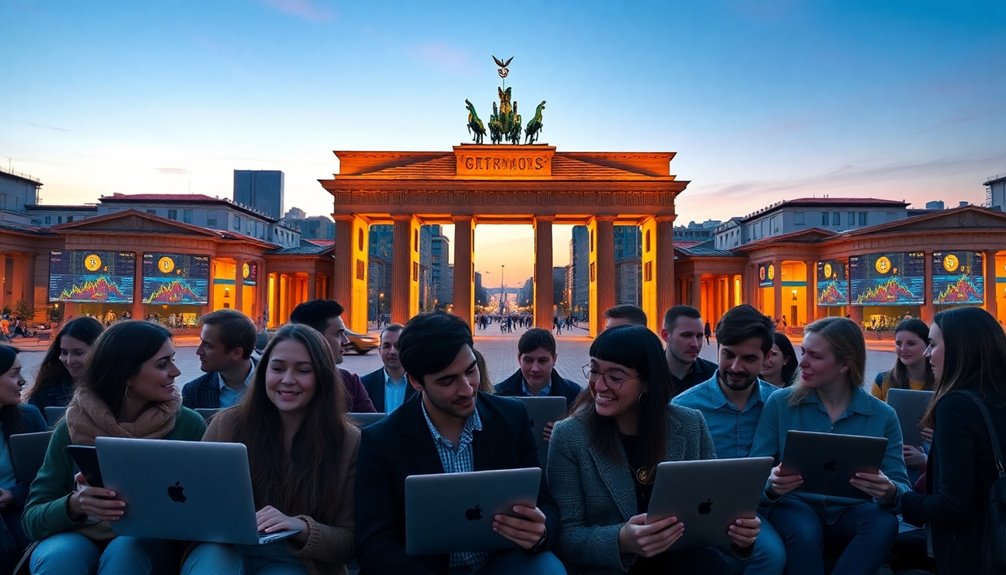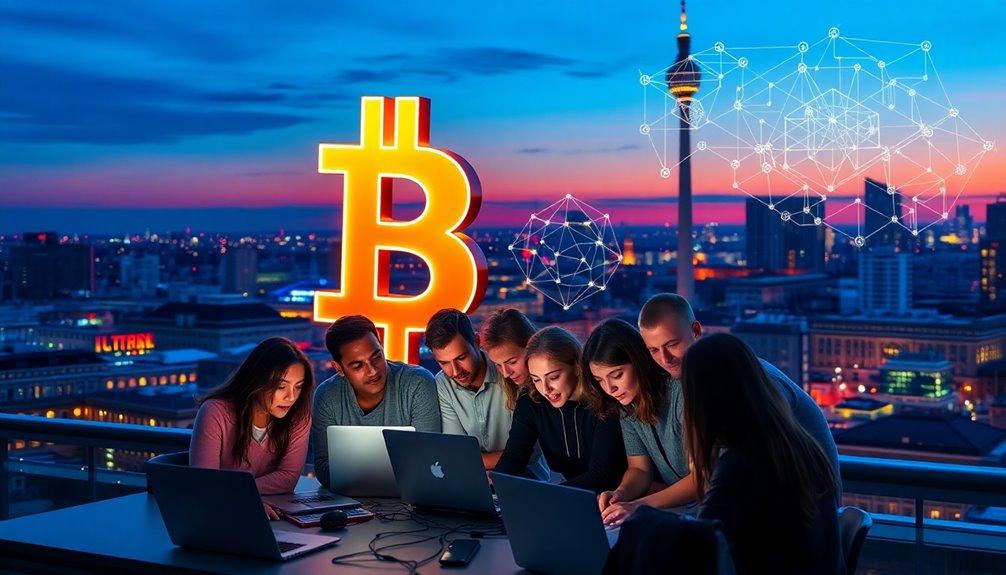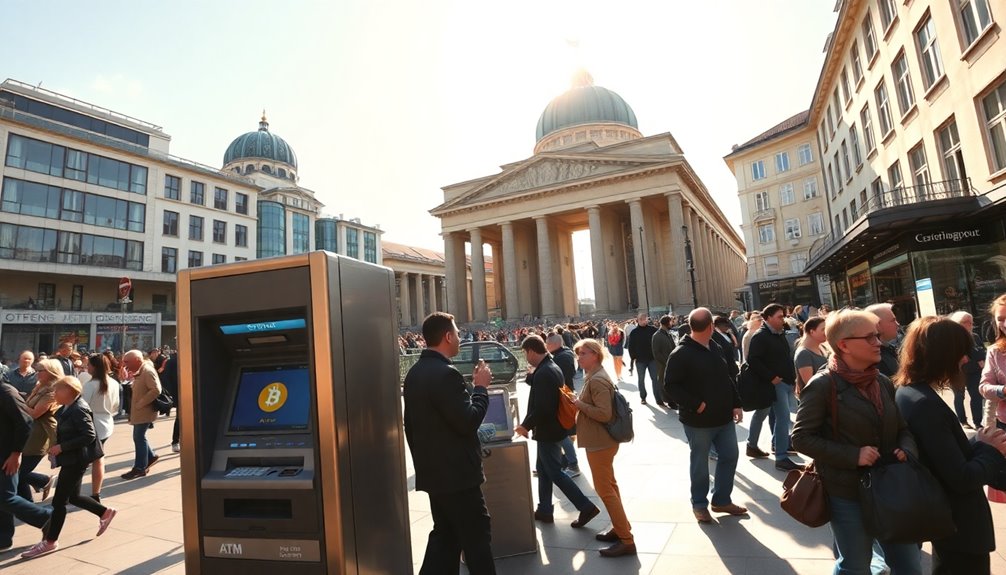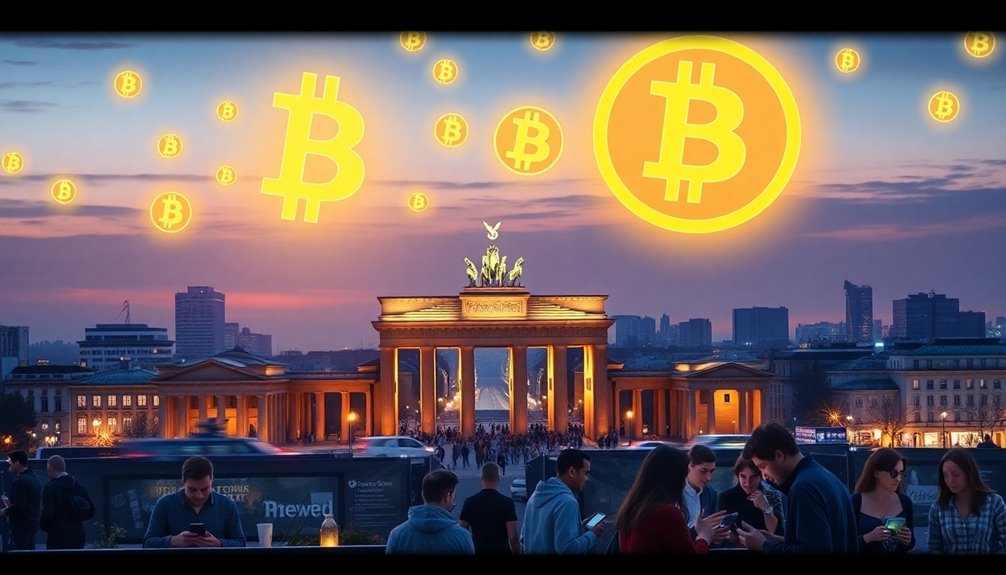Germany's Bitcoin strategy is set to change the digital currency game. By planning to issue government bonds on blockchain, they enhance efficiency and transparency in finance. Mandatory licensing for crypto services ensures compliance, while Bitcoin ETFs open investment opportunities for everyone. This balanced approach between decentralized Bitcoin and a state-backed Digital Euro could help stabilize the market. As they navigate regulatory complexities, Germany aims to lead in regulated digital finance. You'll find that understanding these developments can reveal more about how they're positioning themselves in the evolving crypto landscape.
Key Takeaways
- Germany plans to issue blockchain bonds, enhancing transaction efficiency and transparency in digital finance.
- The introduction of Bitcoin ETFs will democratize investment opportunities for institutional and retail investors alike.
- By holding Bitcoin as a strategic reserve, Germany positions itself against inflation and aligns with global trends.
- Regulatory compliance through mandatory licensing ensures consumer protection and mitigates risks in the crypto market.
- Germany's vision includes a balanced approach between decentralized Bitcoin and a state-backed Digital Euro, fostering innovation while ensuring stability.
Key Concepts of Bitcoin

When you dive into the world of Bitcoin, it's crucial to understand its key concepts: disintermediation, distribution, decentralization, and trustlessness.
Disintermediation removes middlemen in transactions, allowing parties to transact directly online, boosting efficiency and the value of blockchain technology.
Bitcoin's distributed network, powered by thousands of computers, shares the workload, enhancing reliability and security, as there's no single point of failure. This distributed architecture not only supports scalability but also improves overall performance.
Decentralization means no central control exists; each node operates independently, increasing security further.
Lastly, trustlessness eliminates the need for third parties, relying instead on a consensus among nodes that verify transactions on the blockchain.
This transparent system ensures that all transactions are secure and publicly visible, establishing a new paradigm for financial interactions.
Germany's Digital Currency Vision

As Germany embraces the potential of digital currencies, its vision includes innovative strategies that leverage blockchain technology and Bitcoin.
By issuing government bonds on blockchain, it aims for greater efficiency and transparency, positioning itself as a leader in financial technology. Moreover, the recent surge in Bitcoin's price to $94,565 highlights the growing interest and investment potential in the cryptocurrency market. The security risks associated with online transactions must be addressed to foster trust among investors.
Holding Bitcoin as a strategic reserve aligns with global trends, providing a hedge against inflation while diversifying investment portfolios.
Additionally, enabling Bitcoin ETFs within the EU will create regulated investment options, boosting market accessibility for both retail and institutional investors. This approach balances the decentralized nature of Bitcoin with the proposed state-backed Digital Euro, fostering innovation and ensuring regulatory integrity.
Ultimately, Germany's vision sets the stage for a dynamic digital currency landscape.
Transaction Verification Process

Germany's innovative strategies for digital currencies hinge on a robust transaction verification process that ensures security and trust in the system.
When you send Bitcoin, your public key creates an address for receiving funds, while your private key signs the transaction to prove ownership.
Once you broadcast the transaction, multiple network nodes verify its authenticity, ensuring you have sufficient funds. Miners then solve complex algorithms to validate transactions, grouping them into blocks, utilizing the SHA-256 hashing algorithm to enhance network security.
After approximately 10 minutes, these blocks are added to the blockchain, confirming your transaction as permanent.
Each step, from digital signatures to blockchain updates, plays a crucial role in maintaining integrity and preventing fraud, making Germany's approach to transaction verification a model for digital currency systems.
Pros and Cons of Adoption

While the potential benefits of Bitcoin adoption are compelling, they come with significant challenges that must be carefully weighed.
On the positive side, establishing a regulatory framework can enhance efficiency, transparency, and global competitiveness. Bitcoin's role as a reserve asset could hedge against inflation, while ETFs democratize access, boosting financial inclusion and job creation. Moreover, the introduction of Bitcoin ETFs is expected to provide institutional investors easier access to Bitcoin, potentially increasing market liquidity.
However, you must consider the regulatory complexities and compliance issues that accompany this shift. The cryptocurrency market's volatility poses risks for investors, potentially impacting economic stability.
Additionally, reliance on technology raises concerns about scalability and liquidity. Balancing these pros and cons is crucial for Germany as it navigates its Bitcoin strategy and aims to reshape the digital currency landscape.
Germany vs. Other Countries

When comparing Germany's Bitcoin strategy to those of other countries, it's clear that different nations are approaching blockchain and cryptocurrency with varying degrees of enthusiasm and regulatory frameworks.
Germany's Blockchain Bond Initiative stands out, aiming to enhance transparency in the bond market. Meanwhile, the EU explores a digital Euro, which could complement decentralized currencies like Bitcoin. Moreover, Germany is considering Bitcoin as a strategic reserve asset, which could align with similar moves by other nations.
Countries like the US are already leveraging blockchain for financial applications, including Bitcoin as a reserve asset. In contrast, Singapore is proactive in establishing favorable regulatory conditions for blockchain adoption.
Germany's commitment to education and awareness about blockchain technology sets it apart, ensuring that citizens are informed and engaged as the landscape evolves.
Regulatory Compliance Hurdles

As the cryptocurrency landscape evolves, navigating the myriad of regulatory compliance hurdles can be daunting for businesses.
You'll need to secure a mandatory license from BaFin, Germany's Federal Financial Supervisory Authority, if you provide crypto-related services. This includes exchanges, wallet providers, and token issuers, all of which must meet strict consumer protection and anti-money laundering (AML) regulations. Additionally, the 2020 law mandates licensing of exchanges, ensuring that firms comply with the evolving framework.
Smaller firms might struggle with increased documentation and audits, raising operational costs. Additionally, you'll need to implement robust AML measures, including Know Your Customer (KYC) protocols and reporting suspicious activities.
With BaFin overseeing these regulations, staying compliant is crucial for your success. Political instability further complicates the implementation of these frameworks, making it essential to remain adaptable in this evolving environment.
Emerging European Regulatory Frameworks

With the rapid evolution of the cryptocurrency market, emerging European regulatory frameworks are shaping the landscape for digital assets.
The EU's Markets in Crypto-Assets Regulation (MiCA) aims to provide a comprehensive legal structure, focusing on consumer protection and anti-money laundering measures. Since its enforcement in June 2023, it mandates that crypto-asset service providers (CASPs) comply with strict regulatory requirements. This includes the Travel Rule, which requires exchanges to share customer details for all transactions, enhancing transparency and traceability in the crypto space. Additionally, the regulation addresses concerns regarding the environmental impact of cryptocurrency operations, pushing for more sustainable practices.
Additionally, the Digital Operational Resilience Act (DORA) enhances the stability of digital financial services, simplifying cross-border operations for licensed firms. Stablecoin issuers must maintain liquid reserves and provide transparency about their tokens.
Together, these frameworks not only legitimize digital assets but also position the EU as a global leader in regulated digital finance, promoting innovation while ensuring consumer safety.
Decentralized Finance Education Initiatives

Decentralized finance (DeFi) education initiatives are transforming how individuals engage with financial systems, providing accessible resources to bridge the knowledge gap.
You can find online tutorials and courses that cover essential concepts like blockchain technology and DeFi protocols, making it easier to understand the mechanics of this innovative space.
Public blockchain networks ensure transaction transparency, allowing you to track and verify activities, which builds trust in the ecosystem. Moreover, the rise of yield farming has created new avenues for users to earn returns on their investments.
Plus, hands-on experiences through demo environments let you experiment with virtual assets, giving you practical insights into DeFi operations.
Engaging in these educational resources not only enhances your knowledge but also opens up opportunities for yield through lending and staking, making your journey into DeFi both informative and rewarding.
Frequently Asked Questions
How Will Germany's Bitcoin Strategy Impact Global Cryptocurrency Markets?
Germany's Bitcoin strategy could significantly impact global cryptocurrency markets.
You'll notice increased market volatility as its actions influence Bitcoin's price, creating ripples across exchanges.
If other countries follow suit, Bitcoin's scarcity might boost its value, reinforcing its status as "digital gold."
You might also see a surge in institutional investment due to new Bitcoin ETFs, enhancing market depth and liquidity, while setting a precedent for broader global adoption of cryptocurrencies.
What Are the Historical Trends of Bitcoin in Germany?
You won't believe how Bitcoin's history in Germany has unfolded! The nation embraced blockchain technology with its 2019 strategy, laying out a detailed regulatory framework.
Despite this, only 2% of Germans invested in crypto by 2020, revealing skepticism among the public.
However, younger generations show increasing interest, hinting at potential growth.
Government initiatives, like recognizing Bitcoin as legal tender, could significantly shift perceptions and adoption in the future.
Who Are the Key Players in Germany's Bitcoin Ecosystem?
In Germany's Bitcoin ecosystem, several key players shape the landscape.
You've got the Bitcoin Federal Association, which advocates for favorable legislation, and various crypto exchanges like Bitcoin.de and Bitget, offering secure trading options.
Policymakers are actively exploring Bitcoin integration, including proposals for blockchain-based government bonds.
Remember to stay informed about these players, as they influence the future of Bitcoin in Germany and impact your trading experience.
How Does Public Perception of Bitcoin Differ Across Germany?
In Germany, public perception of Bitcoin is a mixed bag.
On one hand, you've got tech enthusiasts and investors diving into the digital asset scene, seeing Bitcoin as a revolutionary opportunity.
On the flip side, traditionalists and skeptics worry about its volatility and regulatory uncertainties.
This juxtaposition creates a dynamic landscape, where excitement meets caution, shaping how individuals approach investing and engaging with cryptocurrencies in their daily lives.
What Technological Innovations Are Emerging From Germany's Bitcoin Initiatives?
Germany's Bitcoin initiatives are driving several technological innovations.
You'll notice advancements in blockchain-based securities that enhance transparency and security in financial transactions.
The use of decentralized ledger technology is streamlining public debt management, while regulatory frameworks are evolving to support crypto custody services.
Additionally, partnerships with industries like automotive are paving the way for innovative applications in the Internet of Things.
These developments position Germany as a leader in digital currency solutions.
Conclusion
Germany's ambitious bitcoin strategy stands to redefine the digital currency landscape, much like the Enlightenment reshaped European thought. By navigating regulatory hurdles and fostering decentralized finance education, Germany's approach could inspire other nations to embrace innovation. As you witness this evolution, you'll see how a balanced perspective on the pros and cons can illuminate the path forward. Embracing this digital frontier might just be the key to unlocking a prosperous financial future for Europe and beyond.









